If you’ve just purchased a gym membership and are new to working out then simply looking at all of the fitness equipment can be pretty intimidating. When you first walk into a gym, you’ll probably see large machines that have hundreds of pounds of iron attached to them. Then, there are stationary resistance band machines, rows of treadmills, stair climbers, large barbells straddled over benches, and a rack full of dumbells. So what do you do? While it’s good to explore all of your options at the gym, there is one workout tool you definitely shouldn’t ignore — the kettlebell.
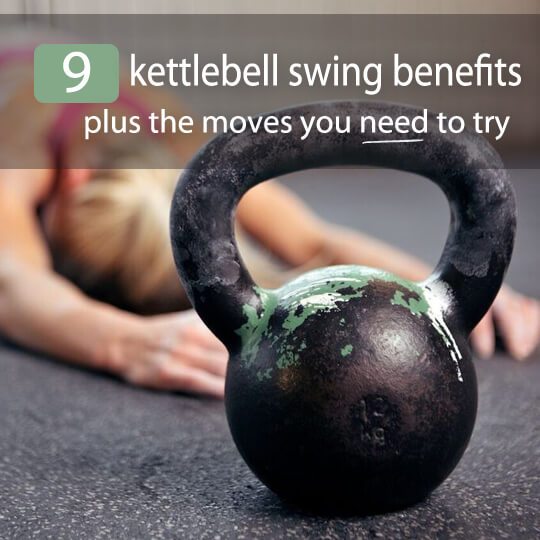
Kettlebells are free weights that look just like cannonballs with handles. You can usually find a few kettlebells sitting next to the long rack of dumbells. Just like with free weights, kettlebells come in a variety of sizes. If you’re a beginner, you can always reach for a small 10-pound kettlebell. If you’re an advanced athlete, you may want to swing around a 100-pound kettlebell! No matter what size you are swinging around, though, there are big benefits to using this workout tool. Before we go over the top nine kettlebell swing benefits, watch this five-minute instructional video on the correct way to do a kettlebell swing.
*Don’t forget to scroll down to the bottom of this article to see six popular kettlebell workout moves!
1) Total-Body Toning
Rather than isolating certain muscle groups with each workout move (as you do when you lift regular dumbells or use a weight machine), kettlebells work all of your major muscle groups at once. In fact, kettlebell swings target over 600 muscles! That’s because when you swing a kettlebell around, your whole body has to work in order to keep yourself in control. With this type of workout, it’s all about stabilizing your core and keeping your balance.
Lower Body
Breaking down the kettlebell swing, the action first targets your body’s lower half. Your leg muscles (mainly your quadriceps, hamstrings, and calves) work with your glutes, hips and lower back to generate force for the swing. According to a 2012 study published in the “Journal of Strength and Conditioning Research,” researchers found the hip-hinge movement of the swing cause the muscles in your lower back and butt to experience a cycle of contractions and relaxation. This cycle helps tone your muscles, giving you that desired lean look.
Middle Body
Once the swing action begins, your body’s midsection kicks into gear. Your abs will immediately contract. Your entire abdomen will work with your back muscles to stabilize the force of the swing, keep your body in balance, and provide you needed strength.
Upper Body
As your arms swing the kettlebell up toward your chest, the primary muscles in your shoulders contract. Additionally, your lats and deltoids act as stabilizers once you reach the upright movement of the swing.
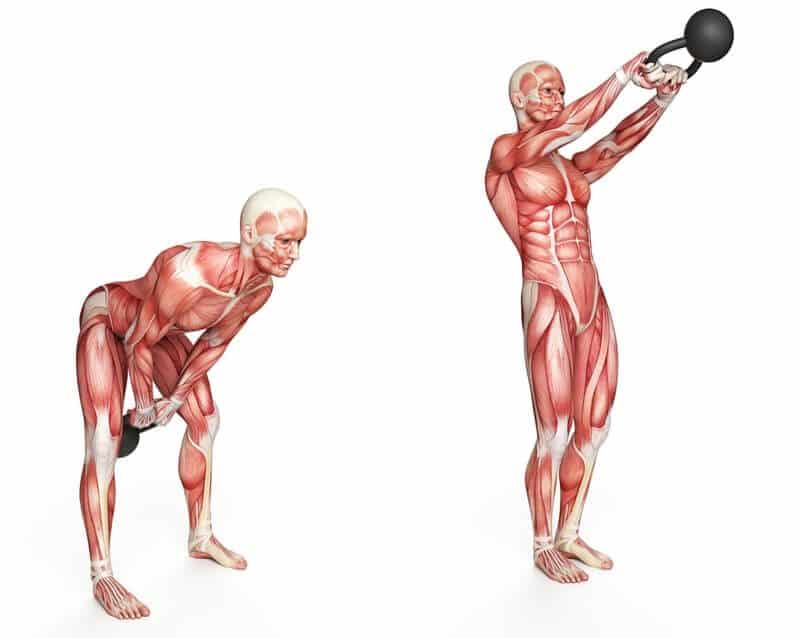
2) Increase Strength
Kettlebell swings are a form of strength training (AKA resistance training), which is a type of exercise that pits muscles against a large force. In this case, that large force is a kettlebell. As you just read, kettlebell swings work more than 600 muscles with just one movement. So it’s no wonder this type of workout can make you stronger in no time!
Despite popular belief, resistance training isn’t only for men. Over the years, countless women celebrities have come forward praising kettlebell workouts. Don’t let the word “celebrities” make you think this type of workout is a trendy fad, though. Kettlebells were reportedly developed in Russia back in the 1700s. So this tool isn’t new to athletes and it’s not going anywhere anytime soon!
3) Increase Endurance
Along with resistance training, kettlebell swings are also classified as cardio. If you’ve ever swung around one of these cannonball-looking weights, you know how it can really get your heart pumping and sweat dripping. The more cardio you do, the more your body will be able to handle.
According to researchers, there are two main factors that contribute to endurance:
- VO2 max – The maximum amount of oxygen a person can consume during exercise.
- Lactate threshold – The exercise intensity at which lactate accumulates in the muscles.
Kettlebell swings (and other kettlebell exercise moves) are a good way to improve both of those factors.
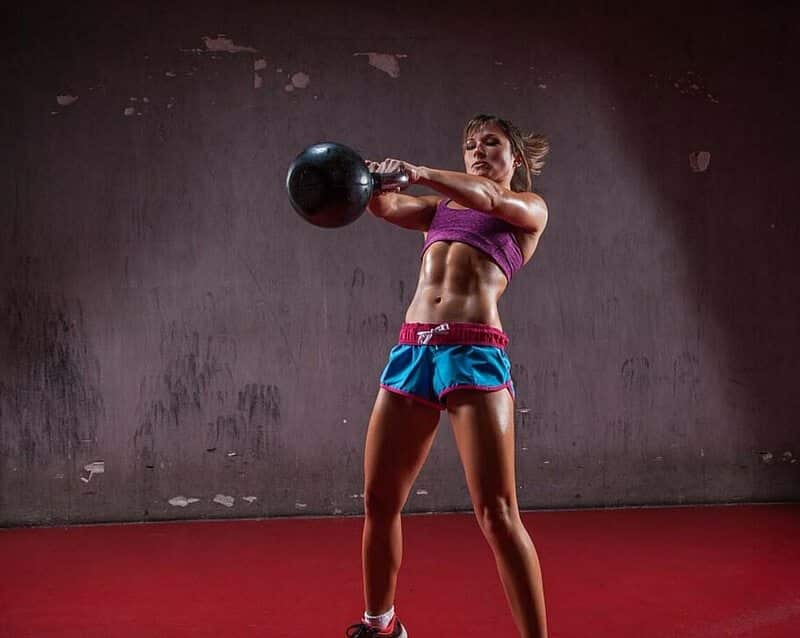
4) Burn Calories
During a study conducted by the American Council on Exercise, researchers found that the average kettlebell workout burns 20 calories a minute. To put that into perspective, that’s a whopping 600 calories in 30 minutes! Plus, don’t forget about the afterburn effect. Intense exercises, like kettlebell swings, can help your body burn calories even after your workout session is over. Desired result? I think so!
Of course, don’t forget to pair your workout efforts with a healthy diet. All of that calorie-killing won’t matter if you put down the kettlebell and then pick up a juicy cheeseburger with a side of French fries!
5) Burn Fat
If you’re looking to burn excess fat from your thighs, belly, or arms, then it’s time to say hello to the kettlebell and make it your best friend. Since swings and other kettlebell moves can burn an impressive amount of calories in a short amount of time and build muscle mass, you will notice your fat disappear in no time.
You’ve probably heard the popular saying, “Muscle burns fat.” While some people tend to exaggerate exactly how much fat muscle burns, that statement is 100% true.
6) Improve Heart Health
Anytime you workout or get active, you are doing your heart a favor. Since kettlebell swings combine both cardio and strength training, though, this form of exercise is one of the best for your vital organ.
According to the American Heart Association, a sedentary lifestyle is one of the five major risk factors for cardiovascular disease. Other factors include obesity, high blood pressure, and high “bad” cholesterol. Luckily, kettlebell swings can help with all of that since they:
- Promote weight loss
- Lower high blood pressure
- Lower bad cholesterol levels
These three factors are extremely important for heart health.

Additionally, exercises like kettlebell swings improve the heart’s overall function. When someone does cardio, their blood flow increases. That flow is directed toward the muscles and then returns to the heart. If the heart continually takes in and pumps out a larger volume of blood, over time it will adapt and your heart’s left ventricle will actually enlarge. A larger cavity allows the heart to hold more blood. So, if you’re an active person, each beat will deliver a bigger burst of blood, allowing your heart rate to slow down. This is a good thing since it takes some of the workload off of your heart.
7) Improve Posture and Balance
A lot of people struggle with poor posture. While slouching certainly doesn’t look pretty, the real issue with poor posture lies in how it affects your overall health. First and foremost, it puts stress on your body, mainly your back. It can lead to health issues such as:
- Back pain
- Joint pain
- Pain in tendons and ligaments
- Breathing problems
- Digestive issues
- Heighten depression symptoms
- Leads to stress
When you workout with a kettlebell, you learn what proper posture feels like. That’s because to properly execute a kettlebell swing, good form is essential. You need to keep your core engaged and your back straight in order to keep your balance. Additionally, any forward bending should come from your hips rather than from slouching your back.
8) Help Reduce Back Pain
According to the Mayo Clinic, an estimated 80% of Americans will experience back pain at some point in their life. If you are someone who suffers from backaches, maybe you should try swinging the pain away. A 2012 study found that kettlebell swings actually have therapeutic benefits. Researchers discovered the movement of a kettlebell swing can reverse posterior strain on the discs in the lower back (namely L4 and L5). That same study stated that other posterior chain exercises, such as back raises and deadlifts, can actually make lower back problems worse.

*Note: If you are looking to use kettlebells for their therapeutic benefits, consult with your doctor first.
9) Makes Performing Real Life Tasks Easier
A kettlebell workout is often referred to as a “functional workout” because it strengthens the muscles you use in your everyday life. Pretty soon real tasks – like carrying your gym bag, lugging around heavy grocery bags, lifting up your dog, and carrying a toddler – will feel much easier.
Picking The Proper Kettlebell Weight
While kettlebell workouts are considered beneficial, it’s extremely important to use the right weight. If you aren’t a physically active person and attempt swinging a weight that is too heavy for you then you run the risk of injury. Most personal trainers recommend beginners try the following weights:
- Women – 15lbs
- Men – 35lbs
Since everyone’s fitness level is different, it’s always a good idea to schedule at least one or two sessions with a personal trainer. They can show you how much weight is best for your body and lifestyle. Plus, they can also teach you a challenging kettlebell workout routine to get you your desired results.
6 Great Kettlebell Moves
In the beginning of this article, you watched a video of a woman demonstrating the popular kettlebell swing. The swing is one of the most common kettlebell moves, however, it’s not the only one. Below are six other beneficial exercises that will help tighten and tone your entire body. Try one or two of these exercises or work them into a longer routine.
One Arm Swing
This move is similar to the traditional kettlebell swing, but it only uses one hand. Grab the weight with one hand (your palm should be facing you). Slightly bend your knees and hinge at the hips. Begin by swinging the kettlebell back between your legs. Then, thrust your hips to swing it to chest height.
*Watch the video in the beginning of the article for tips on mastering proper form!
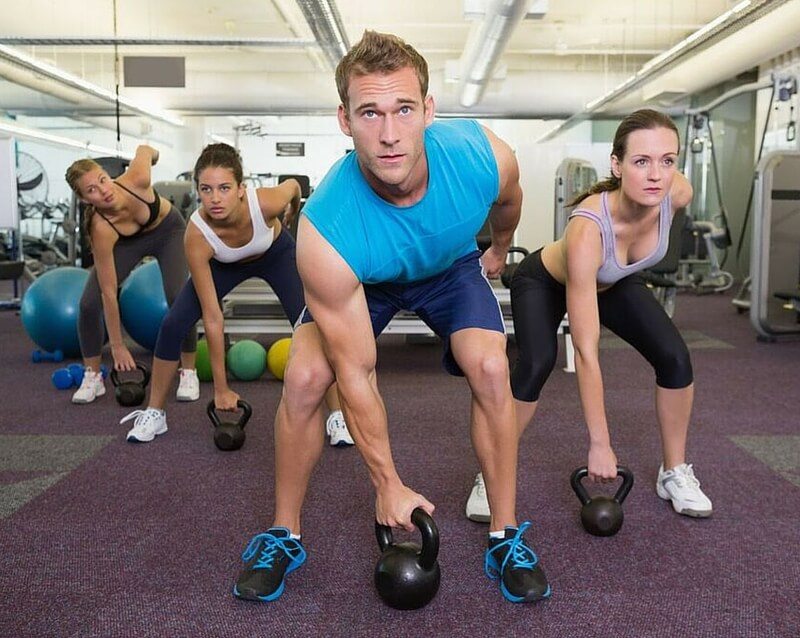
Double Swing
Double up on your weights! Holding one kettlebell in each hand, straddle your legs a little wider. Since this move is very similar to the traditional kettlebell swing, you want to maintain that same overall posture — slightly bent knees and hinged at the hips. Begin by swinging both of your kettlebells back between your legs and then up to your chest. Make sure to swing both kettlebells at the same time.
Around-The-Body Pass
The idea here is to pass the kettlebell from one hand to the next as it’s circling around your body. Begin with the kettlebell in your right hand and swing it as far right as possible. It will begin to circle your body. Then, behind your back, pass the kettlebell to your left hand. Your left hand will continue swinging the kettlebell left and then bring it back in front of your body, where your right hand will grab on again. See this move in action in this short video:
Goblet Squat
Start by gripping the kettlebell’s handles and placing the weight in front of your chest. With your legs hip-width apart, lower into a deep squat.
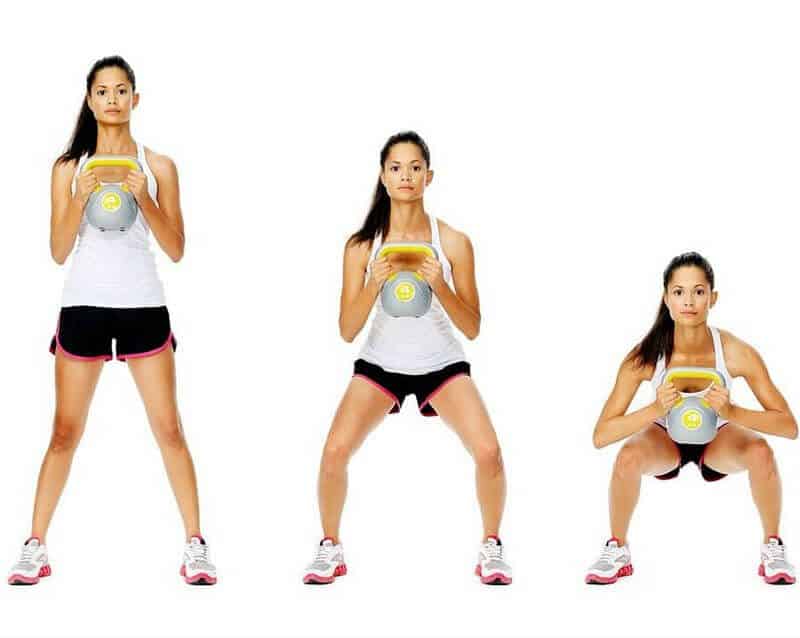
Windmill
Start with your feet about shoulder-width apart, pointed slightly to the left (at about a 45-degree angle). Holding the kettlebell in your right hand, extend your right arm up toward the ceiling. Hinging at the hips, drop your torso down and touch your left hand to your toes. Make sure to keep your back straight. After you touch your toes, raise your torso back up and repeat. Your right arm (the one holding the kettlebell) should be extended straight up in the air the entire time.
Single Leg Roman Deadlift
Grip the kettlebell with your left hand. Keeping your right foot planted on the ground, slowly lift your left foot behind you. As your left foot rises, lower your chest. Make sure to keep your back straight. As your body enters a “T” shape, lower the kettlebell down your thigh and shin (you should be dangling the kettlebell right above the ground once you’ve reached full position).
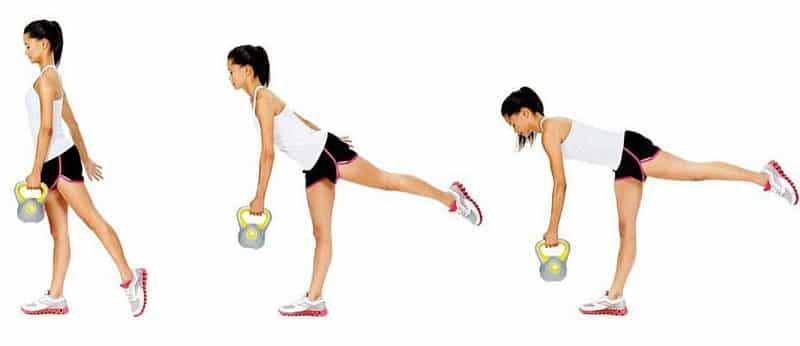
Kettlebell Row
Start by putting one foot in front of the other (as seen in the photo below). Place a kettlebell near your front foot. Next, bend over to grab the kettlebell and pull it toward your stomach, keeping your elbow close to the body and your back straight. Lastly, lower the weight and repeat.
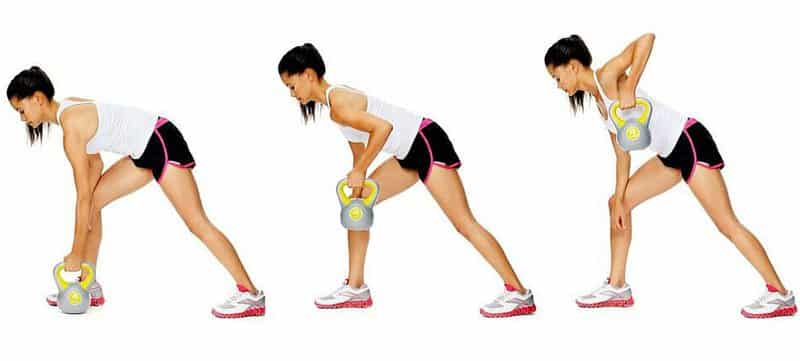
As with anything, whenever you start a new workout it’s always a good idea to consult with your doctor and/or workout professional.
Комментариев нет:
Отправить комментарий